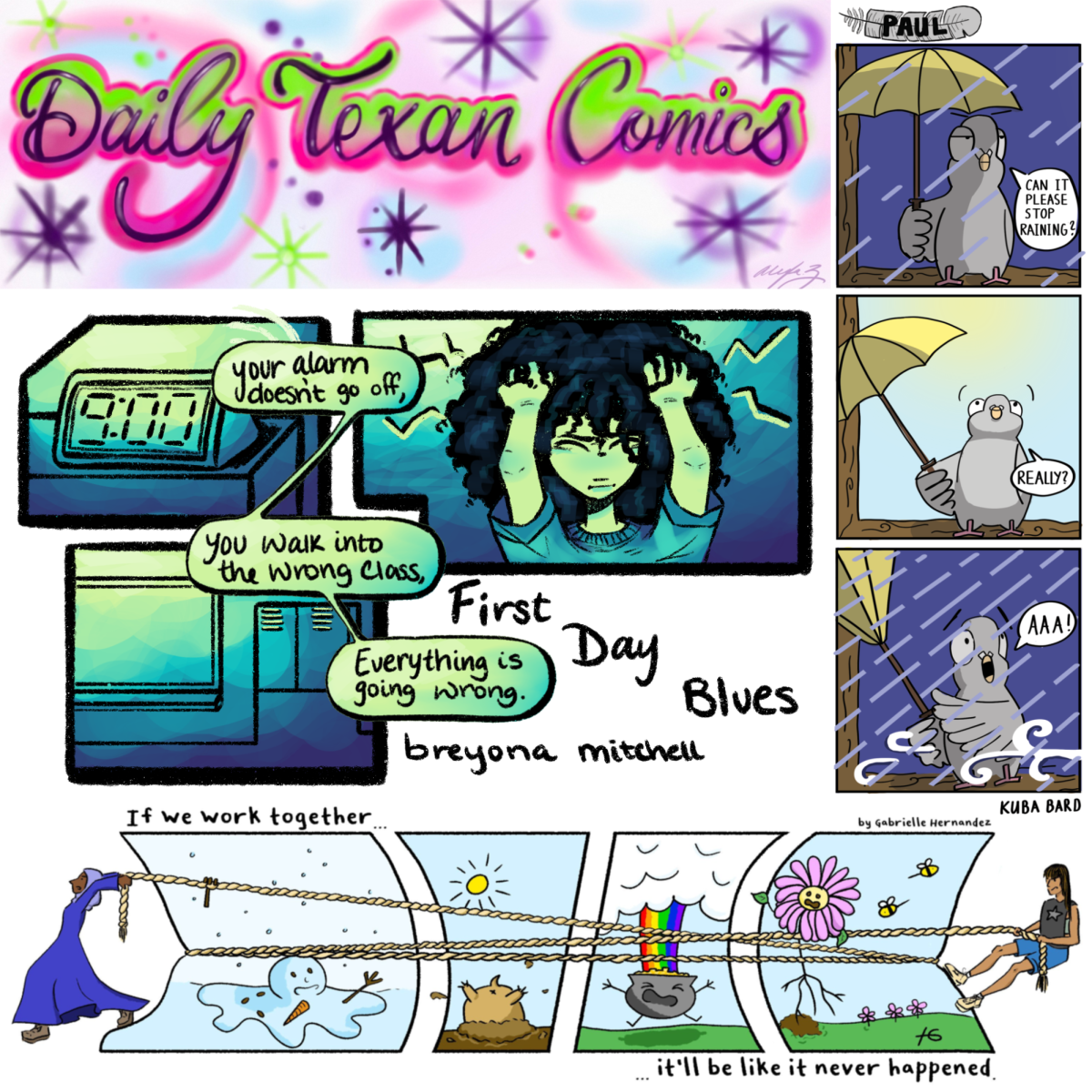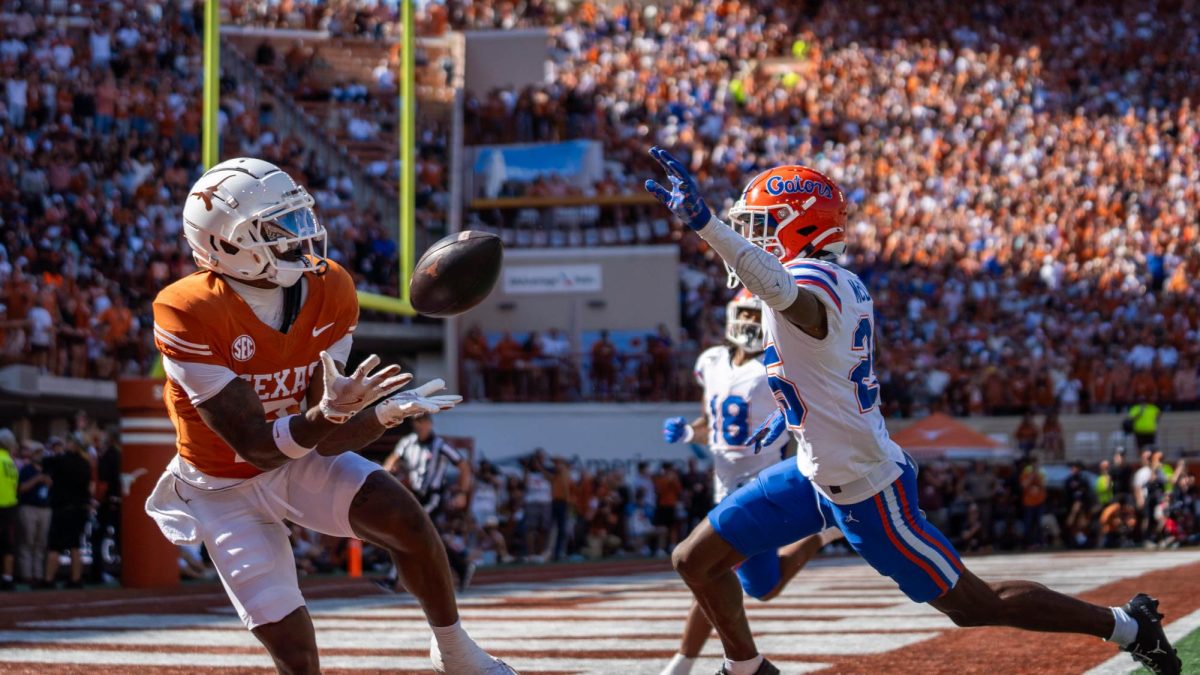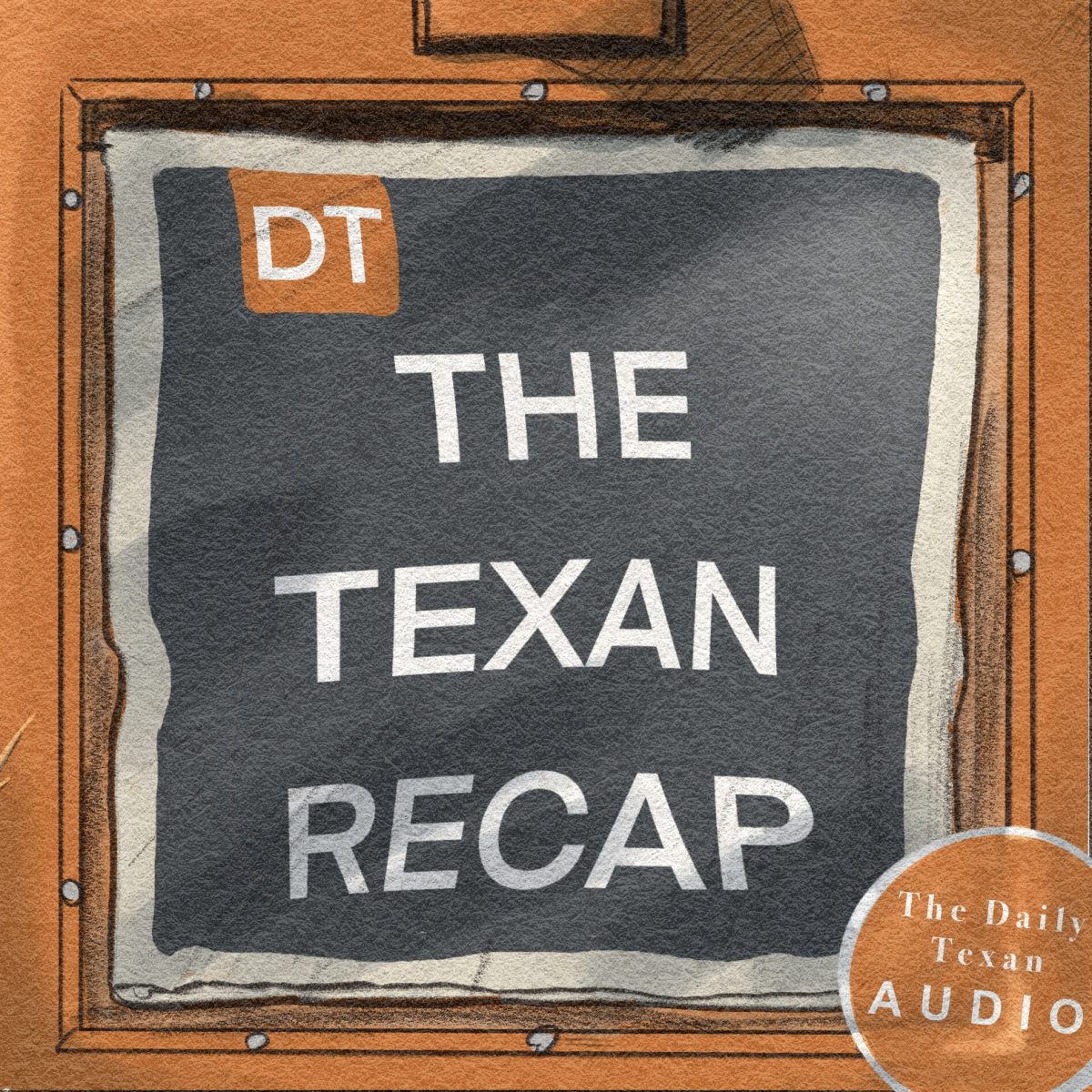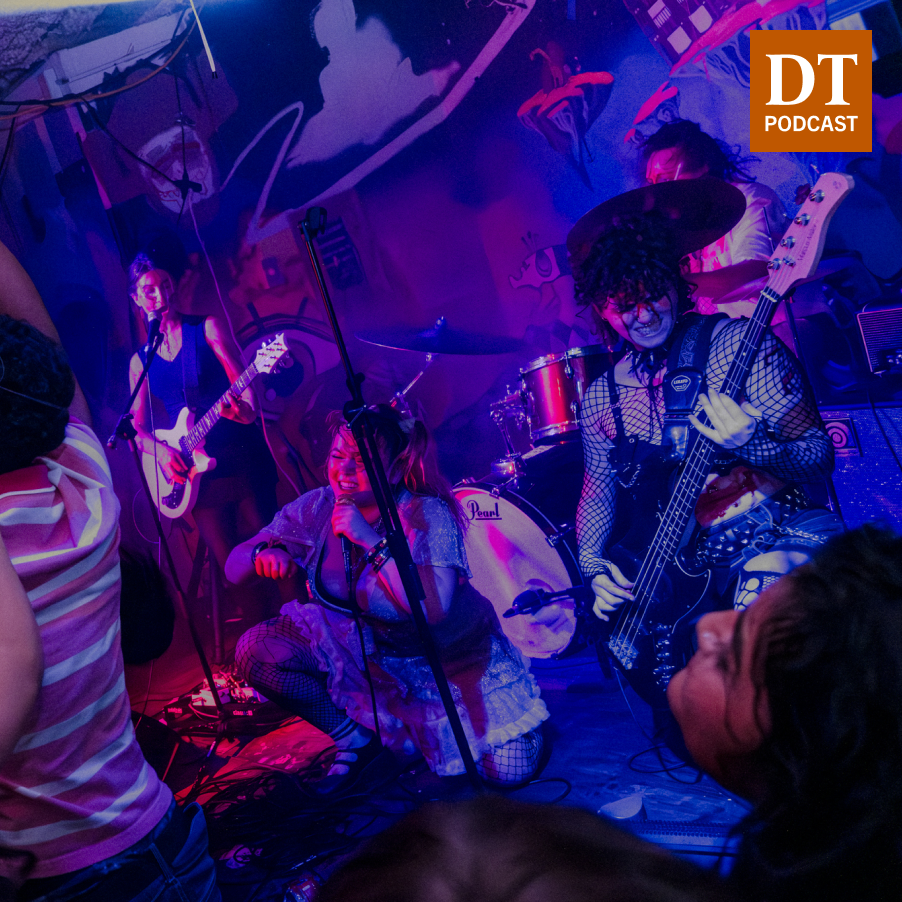Editor’s note: This podcast was originally uploaded on Spotify on Feb. 19, 2024.
In this episode of The Texan Recap, Senior Audio Producer Jack Lewellyn chats about Celine Halioua, a UT alumna who founded a company working towards lengthening the lives of dogs, and country artist and sophomore Kylie Hernandez, who recently transferred to UT from Nashville to grow her music career.
Reported by Mara Ramazanoglu and Flora Farr. Hosted by Jack Lewellyn. Edited by Aislyn Gaddis. Cover art by Emma Berke. Music by Top Flow Productions.
*upbeat music*
Jack Lewellyn: A UT alum is working to extend the lifespan of man’s best friend …and one musician’s transfer to UT and how it’s helping to further their career.
I’m your host this week, Jack Lewellyn, and this is The Texan Recap.
Here’s what you missed this week.
*upbeat music*
Jack: Celine Halioua, a UT alum, founded and leads a company working towards lengthening the lives of dogs. General News Reporter Mara Ramazanoglu is here with the story. Thanks for being here, Mara.
Mara Ramazanoglu: Thanks, Jack. I’m happy to be here.
Jack: To begin, who is Celine Halioua? What is her company and what is it about?
Mara: So Celine runs Loyal, which is a clinical-stage veterinary biotechnology company. And right now, they’re collecting on research on dogs and dog anti-aging, and she’s all about that. And she basically said like her passion for regenerative medicine and for like anti-aging in general started when she was at UT.
Basically, she was part of this neuro-oncology clinic. And she studied Parkinson’s and Alzheimer’s, and she was able to see like the treatments once like these people actually had the diseases, but not like to actually prevent the diseases. So that’s kind of like, what sparked your interest in like anti-aging and like the research about that.
Jack: So the Dog Aging Project is another thing you sort of go into detail on in your article. Can you tell me more about that?
Mara: Yes, of course. So the Dog Aging Project is basically like a separate entity. And it’s like this research initiative out of the University of Washington and Texas A&M. So this research initiative has like an extensive research team devoted to different aspects of like collecting dog anti-aging data and like lengthening the lifespan of a dog and collecting all sorts of research like around that.
I was able to talk to a veterinarian, and she is part of this aging project. And she’s basically part of a research team involved in a clinical trial of this new drug called rapamycin. And so, rapamycin is a drug that the project is testing by basically like they’re running this clinical trial. And then they collect data from the dogs on surveys that the pet owners fill out.
Jack: And then jumping off of that sort of on the same topic of research, I know Loyol is currently working on something based on info being collected by their research team. Could you elaborate on that?
Mara: So basically, Loyal has several drugs that they’ve been developing. So like the first one is…LOY-001. So this is like their first drug. And basically, this LOY-001 drug is more geared toward larger senior dogs. And she told me that once they complete the safety and manufacturing sections, and in addition to other requirements, then the vets will be able to prescribe this drug. So it’s still in the process of actually being distributed and being accepted by the FDA.
And then they also have a second drug and they even have a third drug, but the LOY-002 drug is targeted towards like a more wider range. So this one is intended for all senior dogs of a wider range of sizes. So for me, like I can understand that through the data that Loyol is collecting, they’re gearing to expand their range of dogs that they can treat, and dogs that they can help to lengthen the lifespan of any size or any breed of dog, right?
And so loyal has this initiative called Project Wishbone. And, in a way similar to the Dog Aging Project, this project collects data through surveys, the pet owners will fill out a survey, but what I thought was particularly interesting about Loyal survey was that it collects data on like more of the dog’s environment in like, in a more emotional sense.
They have this more holistic view of the dog, where they can kind of view the behavior and view more of the dog’s life, and how they like what behaviors they engage in, or like, what emotions they like, are they usually energetic? Are they usually, you know, sleepy, like, they’re more like looking at the dog’s personality. And also, I believe it said it was like only 10 minutes, like a 10-minute survey, as opposed to like this extensive survey with like the Dog Aging Project. This one seems like in a similar way, collecting data from the dogs but in a very interesting and different way.
Jack: Excellent. And just to get another perspective on this, I know you also spoke to a current UT student about this. So what were some of the things they told you?
Mara: I spoke with Jazmin and she is a psychology junior, and she has a dog and her name is Domino, and Jazmin gave me a lot of like interesting perspectives on being a college student and owning a dog and considering like these unknown own medicines that are like emerging on the market that are not really heard of, but may achieve like mainstream in the future, right? So, one thing interesting about Jazmin is that Domino is her emotional support animal.
One important question that I asked her is, you know, of course, when you consider enrolling your dog and one of the studies, like, would you consider filling out one of these surveys that one of these research initiatives provide for like the public. And one interesting thing that I didn’t even consider is that she said that while she would consider like taking one of these surveys, it would be important to consider like the time aspect, so if it wasn’t time-consuming, then she would be more open to it.
And that’s one thing I think that’s important to consider with like college students. Because, you know, for example, for Project Wishbone for Loyal, you have to like examine your dog and their natural environment for like, a longer period of time, whereas college students may not have the time to be watching their dog at all times, and like viewing their behavior and viewing their, like the personality of their dog because, well, they’re in classes, and they’re having, you know, to fulfill responsibilities.
So I thought definitely, like, it was important to have that perspective of someone who is a college student, but also has a dog and has expenses, and of course, like wants their dog to, you know, live longer and may consider these medicines. But in terms of actually like, providing data and helping out, it may be like a factor, it may serve as like a barrier and just being a college student.
Um, and then another thing, of course, that was important is affordability, right? So, for college students, we already have so many expenses to cover. And one question that I asked Celine was, do you intend for this to be more of like a high-end product or geared to like the average consumer? And so she said that her intention, and her goal is that the drug can be as affordable as possible for all that needed. And of course, that’s like an idealistic goal that any company should have, especially with like dog anti-aging, and like regenerative medicine. But of course, Jasmine noted that, like, even if it was, you know, relatively mainstream, relatively popular, like if it was proven safe, and if it was proven effective, like I don’t even know if I would be able to afford it.
And then lastly, one actually important thing that I noted down in the story is that she said that, you know, these drugs are intended to extend the lifespan of like, one to two years. And what she said was that she wasn’t sure of like, how impactful one to two years would be, because age and like the, you know, the time or the lifespan of a dog or the lifespan of anyone, it’s not like it’s not a short thing. So you can’t really like predict you can’t really have like a strict timeline. So I just thought that was like an interesting perspective to include.
Jack: Well, once again, that was General News Reporter Mara Ramazanoglu. Thanks again for being here.
Mara: Thank you so much! I’m so glad I got to answer all the questions.
*upbeat music*
Jack: After switching schools, sophomore Kylie Hernandez is planting herself in Austin to grow her music career. Senior Life and Arts Reporter Flora Farr is here to tell us all about it. Thanks for joining me, Flora.
Flora Farr: Thanks for having me.
Jack: So just to start us off, could you tell me about Kylie Hernandez herself?
Flora: So Kylie is really interesting. She is from Texas. Her family is one full of Longhorns. And she’s now a sophomore advertising major here at UT. Prior to that, she was at Belmont University since she started at UT. She is an advertising major, like I said, but she’s also a minor in media and entertainment, which is kind of helpful with her career path that she wants to have. And then she also started that new talent was signed this past semester. And she also is in an acapella group on campus to help extra with her voice training. So that’s fun.
Jack: Excellent. So you just mentioned her switch from Belmont University to UT. Could you elaborate on that?
Flora: Yeah. So it’s really interesting with her music career because most people start somewhere else like relatively small and then they go to Nashville if you’re a country artist, but for Kylie, she started here went to Nashville, and decided it wasn’t for her quite yet. She was in Belmont’s songwriting program, which is a really huge program, obviously, because of the location. Everyone there is really involved in music and everybody kind of wants to be a star is what Kylie was kind of saying.
And while that helped her a lot and learning about the commercial and music industry, it didn’t really help her with what she was expecting to do, which was develop herself more creatively in her songwriting and also just like in learning more about what kind of brand she wants to have as an artist. So she decided that it would probably be better to go to UT instead, just because one like Austin’s still a really great music world, but also a relatively smaller country world, and so it’s easier for her to kind of put herself out there starting here and sort of competing against everybody else in Nashville from the get-go.
Jack: For sure. Now let’s see, you also mentioned earlier about the UTalent sort of record label. What exactly is UTalent and what are they doing for Kylie?
Flora: So UTalent has been running for a few years now. It’s a student-led record label and with Kylie…she’s a signed artist., I believe they only have like a handful of sign artists right now. She’s one of theirs. And she’s their only country artist. And what they do is they help her develop her brand. They do marketing gigs with her. So they help her with photoshoots that she can post on her social media to kind of get the word out there. They actually did a photo shoot recently to work on the cover for the album. So that was fun. They also hook her up with studio time that she can have to record all the stuff for her album, or different singles that she wants to do. And during the studio time, she also gets to different musicians that are part of the talent that they kind of match her up with. So that’s really fun. They like got her a whole band together for the album. And they record together and just kind of like have fun in the studio. She posted a video of herself singing “Fade Into You” by Mazzy Star the other day. And so they just do kind of fun things like that to practice. But yeah, they’re really helpful. They also help her budget for all of that. So she has a financial chair, a marketing chair, and multiple other people that I can’t even remember. But yeah, it’s really cool.
Jack: So elaborating more on some of that, I know, you spoke with Kylie’s marketing chair specifically, could you tell me some of what they said?
Flora: So her marketing chair is Heidi Melgar, and she’s a freshman business major. And she was really excited to work with Kylie because of her personality, and that was the kind of thing that came across with also the other chair that I had interviewed Sanni. But so she was really excited to work with her because of her personality and the way she’s very driven about her work.
She never comes to them empty-handed, she always comes with like a Pinterest board of different things that she wants, like as an aesthetic, I guess for her music. And that’s been really helpful with her and Heidi’s relationship, obviously, because you need to get to know the person really well in order to help them present themselves in the way that they want.
And so they’ve worked really closely together and really well together in that aspect, and that’s something that Kylie had been really excited about because she feels more like confident now that she’s been at UT and a part of UTalent and more sure of who she wants to be as an artist. And I think that’s partially through Heidi’s help. So that’s cool.
Jack: And just as a last thing to cover, now that Kylie is working on her career at UT, what’s she planning to do now and sort of in the future?
Flora: So after the album is out, she’s hoping to do performances, whatever she can. Currently, she likes to perform at the Cactus Cafe, like open mic nights. She’s done that once and she wants to try to do that again. She has one performance coming up, but she’s trying to find different gigs with UT on campus as much as she can. And she is interested in doing things off-campus because there’s so many different venues to perform at. And as far as after then she really…she did tell me that she wants to go all the way like as far as she can. And if that leads her back to Nashville…she’s hopeful for that eventually, whenever she is ready, but until then she’s just sticking here and doing as much as she can.
Jack: Alright. That was Senior Life and Arts Reporter Flora Farr. Thanks again for being here.
Flora: Thank you.
Jack: And that’s The Texan Recap for the week of February 12th. I’m Jack Lewellyn.
*upbeat music*
Jack: The Texan Recap is a production of The Daily Texan Audio Department.
If you liked this episode, make sure to subscribe to The Daily Texan on your streaming platform of choice and follow us on Twitter @texanaudio.
This episode was hosted by me, Jack Lewellyn, and edited by Aislyn Gaddis.
Special thanks to Mara Ramazanoglu and Flora Farr for their reporting and to Joelle Dipaolo, Mimi Calzada and Chloe Moore for contributing to this project.
Cover art is by Emma Berke and music is by Top Flow Productions. To read the news stories in this episode or see more from the Texan, head on over to www.thedailytexan.com.
Thanks for listening, and I’ll see you next week












